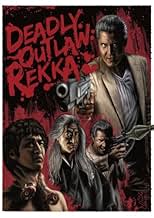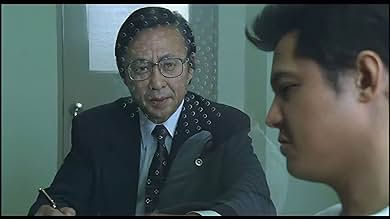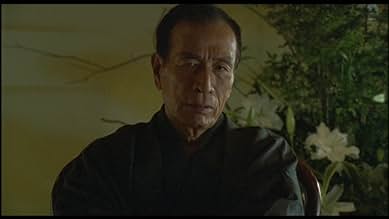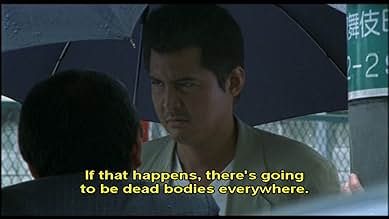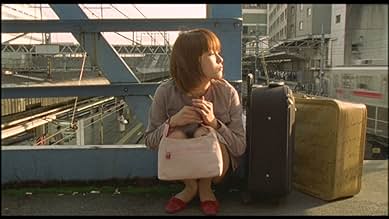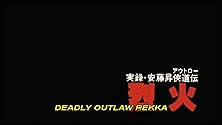Jitsuroku Andô Noboru kyôdô-den: Rekka
- 2002
- 1h 36min
CALIFICACIÓN DE IMDb
6.7/10
1.8 k
TU CALIFICACIÓN
Agrega una trama en tu idiomaWhen his beloved boss is killed, a dangerous young gangster cuts a path of vengeance through the Japanese mafia.When his beloved boss is killed, a dangerous young gangster cuts a path of vengeance through the Japanese mafia.When his beloved boss is killed, a dangerous young gangster cuts a path of vengeance through the Japanese mafia.
- Dirección
- Guionista
- Todo el elenco y el equipo
- Producción, taquilla y más en IMDbPro
Opiniones destacadas
DEADLY OUTLAW: REKKA is a rare misfire from the usually interesting Takashi Miike, who can typically be relied upon from making outrageously entertaining movies. This is a standard Yakuza movie, featuring a low rent thug who decides to go on an odyssey of revenge, yet despite a few moments of surrealism and violence you can't really tell it's a Miike film at all.
Instead it has more in common with low budget art-house fare, featuring interchangeable characters and some padded scenes of characters wandering the streets aimlessly at night. Oh, there's bound to be a brutal fight scene or execution around the next corner, but there isn't anything that makes you care about what's going on. Okay, I don't watch a Miike film for the characterisation, but at least ICHI THE KILLER had tons of incident and AUDITION's slow build worked when matched with THAT ending.
This one's predictable in the extreme, I couldn't care less about the characters, and the whole 'stone face' type of acting is just a bit dull. Miike tries to spice things up with a sex scene here and a mutilation there, but it isn't enough; for much of the running time, I was simply bored. DEADLY OUTLAW: REKKA does have the same kind of hustle and vibe as the early gangster films of Beat Takeshi, but it lacks their finesse and raw power. Attempts to make it feel like an old-fashioned grindhouse movie of the 1970s don't really gel either; instead this movie is both slight and forgettable.
Instead it has more in common with low budget art-house fare, featuring interchangeable characters and some padded scenes of characters wandering the streets aimlessly at night. Oh, there's bound to be a brutal fight scene or execution around the next corner, but there isn't anything that makes you care about what's going on. Okay, I don't watch a Miike film for the characterisation, but at least ICHI THE KILLER had tons of incident and AUDITION's slow build worked when matched with THAT ending.
This one's predictable in the extreme, I couldn't care less about the characters, and the whole 'stone face' type of acting is just a bit dull. Miike tries to spice things up with a sex scene here and a mutilation there, but it isn't enough; for much of the running time, I was simply bored. DEADLY OUTLAW: REKKA does have the same kind of hustle and vibe as the early gangster films of Beat Takeshi, but it lacks their finesse and raw power. Attempts to make it feel like an old-fashioned grindhouse movie of the 1970s don't really gel either; instead this movie is both slight and forgettable.
Assassins from the Otaki group murder Yuya Uchida (manager/producer of 1970's psychedelic prog metal band Flower Travellin' Band, who provide the film's soundtrack) leader of the Sanada group. Riki Takeuchi considered him a father figure and wants vengeance, but the leaders of both groups want to avoid a war and enlist Bando group leader Sonny Chiba to negotiate a truce.
So ... it's all a scheme by both groups second-in-commands to eliminate the leaders and take over, with Chiba running the whole show. They trick Takeuchi into killing Otaki group leader Renji Ishibashi and then try to kill him to close all loose ends. Those loose ends stay very much open.
Takashi Miike has a tendency to make films that are so loose and ramshackle that they feel like they may fall apart at any minute. This is one of those. That doesn't mean they're necessarily bad ... and this one certainly isn't ... but it does mean that after a really dynamic opening and before it's amazing gonzo conclusion, you get a lot of meandering scenes of yakuza dumping plot exposition on each other. It's not always dull ... mainly due to Miike's tendency to stage very weird scenes like two yakuza talking outdoors in a playground in the rain each holding tiny transparent plastic umbrellas ... but it frequently is.
The Flower Travellin' Band soundtrack is worth the price of admission.
So ... it's all a scheme by both groups second-in-commands to eliminate the leaders and take over, with Chiba running the whole show. They trick Takeuchi into killing Otaki group leader Renji Ishibashi and then try to kill him to close all loose ends. Those loose ends stay very much open.
Takashi Miike has a tendency to make films that are so loose and ramshackle that they feel like they may fall apart at any minute. This is one of those. That doesn't mean they're necessarily bad ... and this one certainly isn't ... but it does mean that after a really dynamic opening and before it's amazing gonzo conclusion, you get a lot of meandering scenes of yakuza dumping plot exposition on each other. It's not always dull ... mainly due to Miike's tendency to stage very weird scenes like two yakuza talking outdoors in a playground in the rain each holding tiny transparent plastic umbrellas ... but it frequently is.
The Flower Travellin' Band soundtrack is worth the price of admission.
Those of you that are used to American-style movies, don't watch this because you're probably going to be bored. People, like me, who are used to weird Japanese movie-styles will mildly enjoy this movie. The editing is very strange, sometimes you get the impression that your DVD has skipped, the sound is also weird in some places, I can't explain exactly what's wrong with it but watch this film and you'll know what I mean.
I recently watched "Imprint". That's an episode in the "Masters Of Horror"-series directed by Takashi Miike. THAT's what I call a strong and violent film. It was awesome!
Don't expect too much and you will be entertained. But not as much as you expected. A decent watch. Nothing to keep.
I recently watched "Imprint". That's an episode in the "Masters Of Horror"-series directed by Takashi Miike. THAT's what I call a strong and violent film. It was awesome!
Don't expect too much and you will be entertained. But not as much as you expected. A decent watch. Nothing to keep.
Rekka is a movie that deals with the theme of backstabbing and diplomacy of the new Yakuza clashing against the violence and honor of the old Yakuza; a common theme in Miike's under-the-radar gangster movies. It begins when the protagonist's father, the leader of a crime family, is killed. Before he knows what's happening, the new boss of his gang is already making agreements and accepting the murder to avoid a full-scale gang war. Needless to say, the son isn't happy, so he seeks revenge on the rival crime family. Knowing this, the new boss tries to get rid of him so that he can enjoy his new place in the Yakuza hierarchy.
On its own, this is an exciting modern Yakuza thriller filled with bloodshed and intrigue. But if you're already a Miike fan, you might be let down by a few details.
Rekka follows a pretty distinct formula. It has the same plot ideas, nearly the same characters, some of the same actors, and the same filmmakers as Agitator and Kikoku (which came out later). While Miike changes up the style and feel of each one, it still looks like he made three different versions of the same movie. Shigenori Takechi, the screenwriter of all three, has to be the laziest guy in the film industry. You see the same characters doing the same things, only with different names and settings. Like the other movies, the protagonist is a seemingly invincible and honorable guy who just can't seem to get killed no matter what he does. There is a charismatic and equally invincible hit-man chasing him. There are greedy and cowardly superiors that only he can stand up to. There is a dethroned and deceased father figure that he wants to avenge. And of course, there is a love interest that appears for a few minutes combined and has no personality or reason to even be in this movie.
The way that this movie is different is that the feel is a little more intense and modern than the other two. The visuals and camera-work are comparatively better and do a much better job of grabbing your attention. It is not as slow-paced and complicated as Agitator (clearly the best of the three), and it's all-around better than Kikoku (the worst). The ending is the most unique part. For better or worse, it is incredibly strange, and I know that some people will like it. Rekka appears to have the largest budget of the three movie and is the easiest to understand; it's definitely the one to show to your friends.
Like those two other movies, there are no insane shocker moments or incredible gore effects that will stick in your head forever. Rekka has almost nothing in common with Ichi or Fudoh, for example, so new fans of Miike's work might not get what they expect. But it has more than its share of violence, just not enough to make your head spin.
On it's own, Rekka is definitely not a waste of time, and my criticism doesn't sound fair at all. However, the feeling is ruined when you've seen Agitator and/or Kikoku. Seeing these movies after each other in a short span of time left me with a feeling that I got from Graveyard of Honor, another Miike/Takechi product. But in that case, it only took one movie to make me feel uncomfortable by giving me the same message over and over again.
On its own, this is an exciting modern Yakuza thriller filled with bloodshed and intrigue. But if you're already a Miike fan, you might be let down by a few details.
Rekka follows a pretty distinct formula. It has the same plot ideas, nearly the same characters, some of the same actors, and the same filmmakers as Agitator and Kikoku (which came out later). While Miike changes up the style and feel of each one, it still looks like he made three different versions of the same movie. Shigenori Takechi, the screenwriter of all three, has to be the laziest guy in the film industry. You see the same characters doing the same things, only with different names and settings. Like the other movies, the protagonist is a seemingly invincible and honorable guy who just can't seem to get killed no matter what he does. There is a charismatic and equally invincible hit-man chasing him. There are greedy and cowardly superiors that only he can stand up to. There is a dethroned and deceased father figure that he wants to avenge. And of course, there is a love interest that appears for a few minutes combined and has no personality or reason to even be in this movie.
The way that this movie is different is that the feel is a little more intense and modern than the other two. The visuals and camera-work are comparatively better and do a much better job of grabbing your attention. It is not as slow-paced and complicated as Agitator (clearly the best of the three), and it's all-around better than Kikoku (the worst). The ending is the most unique part. For better or worse, it is incredibly strange, and I know that some people will like it. Rekka appears to have the largest budget of the three movie and is the easiest to understand; it's definitely the one to show to your friends.
Like those two other movies, there are no insane shocker moments or incredible gore effects that will stick in your head forever. Rekka has almost nothing in common with Ichi or Fudoh, for example, so new fans of Miike's work might not get what they expect. But it has more than its share of violence, just not enough to make your head spin.
On it's own, Rekka is definitely not a waste of time, and my criticism doesn't sound fair at all. However, the feeling is ruined when you've seen Agitator and/or Kikoku. Seeing these movies after each other in a short span of time left me with a feeling that I got from Graveyard of Honor, another Miike/Takechi product. But in that case, it only took one movie to make me feel uncomfortable by giving me the same message over and over again.
Miike shows us in this film his outstanding gift for the yakuza genre from the first minute to the last. This time he adds a soundtrack from the Flower Traveling Band, Satori, a Doom Metal key album from 1971 that makes those master shoots, of perfect color, shine without stopping during the cinematographic experience he proposes.
His characters flow before the viewer like a handful of impossible to stop Japanese scarfaces. Shinjuku, mafia, escorts, magic and Rock and Roll !!
¿Sabías que…?
- TriviaTakashi Miike cut this movie to the strains of the 1971 progressive rock album "Satori" by the Flower Traveling Band, which he learned of through costars Joe Yamanaka and Yûya Uchida, who were also the band's founding members. Miike found the album to be way ahead of its time and was delighted at how well and inconspicuously it cut into a movie made 30 years later.
- ErroresAt 35:52 the shadow of someone holding a hand-held camera can be seen.
- ConexionesReferenced in Rewind This! (2013)
Selecciones populares
Inicia sesión para calificar y agrega a la lista de videos para obtener recomendaciones personalizadas
Detalles
- Fecha de lanzamiento
- País de origen
- Sitio oficial
- Idioma
- También se conoce como
- Deadly Outlaw: Rekka
- Productora
- Ver más créditos de la compañía en IMDbPro
- Tiempo de ejecución1 hora 36 minutos
- Color
Contribuir a esta página
Sugiere una edición o agrega el contenido que falta

Principales brechas de datos
What is the Spanish language plot outline for Jitsuroku Andô Noboru kyôdô-den: Rekka (2002)?
Responda
